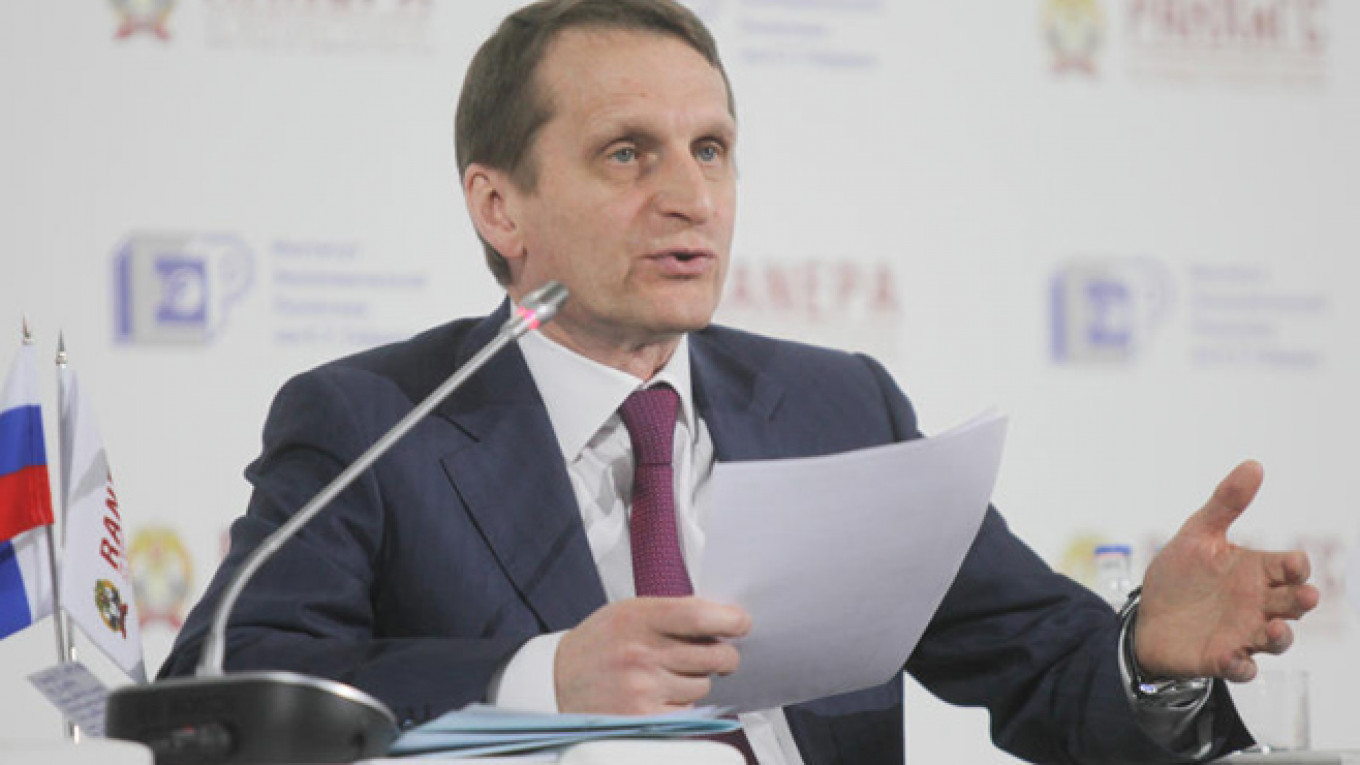Despite President Vladimir Putin's claim earlier this month that the Ukrainian presidential election on May 25 represents a step "in the right direction," Russian officials have said Russia might not recognize the newly elected government in Kiev.
State Duma Speaker Sergei Naryshkin told channel Rossia 24 on Wednesday that the president Ukrainians will elect will not have full "legitimacy."
Naryshkin said that the "essentially punitive conditions [...] for two areas where 7 million people live" — referring to the eastern and southern regions of Ukraine — compromised the legitimacy of the political exercise.
"I have difficulty imagining how these elections can be completely legitimate," Naryshkin said. "But it is obvious that the failure to conduct elections would be an even sadder situation. We have to choose the lesser of two evils."
Last week, Foreign Minister Sergei Lavrov also expressed his doubts about Ukraine's ability to conduct legitimate election, insisting that the ongoing violence in the country's east undermines Ukrainian authorities' capacity to hold a fair and free election.
"Conducting elections in a country at a time when the army is using force against a portion of its population is quite unusual," Lavrov said, Interfax reported.
But for political analysts, Russia's reluctance to recognize the legitimacy of elected Ukrainian authorities stems more from the country's foreign policy on Ukraine than from the current unrest in the eastern and southern regions of the country.
"Ukraine has plenty of experience conducting elections and I believe it has the ability to conduct a legitimate presidential election on May 25," said Viktor Mironenko, head of the Ukrainian Studies Center at the Russian Academy of Sciences' European Institute.
"Now that Russia's decade of love for [ousted president] Viktor Yanukovych is over, the country is still struggling to view new Ukrainian political actors as legitimate. No matter who wins, Russia will still have strained political relations with the new Ukrainian leadership," he said.
Russia's hesitations about the legitimacy of the upcoming election also take root in the current interim government's "mistakes," according to Nadezhda Arbatova, a scholar at the Institute of the World Economy and International Relations at the Russian Academy of Sciences.
"Russia distrusts Ukrainian political processes not only because of the situation in the eastern part of the country but also because the interim government in place now has made mistakes that seriously compromise the country's attempts at legitimizing its politics," Arbatova said.
One of these mistakes, Arbatova said, was that it "did not embark on a productive dialogue with the regions, hurrying instead to retract the law on regional languages," which did not help it become legitimate in the eyes of Russia.
Analysts also agreed that Russia does not have a favored candidate in the upcoming presidential election. Russia's reluctance to pick a favorite contrasts with the approach of the U.S. and other Western nations, which have expressed — at times implicitly — their preferences for the composition of the new Ukrainian leadership.
Presidential candidate Yulia Tymoshenko, the country's former prime minister, convicted of embezzlement in 2011, was forced to cancel a visit to Washington in late April after U.S. senators declined to meet with her.
In February, a leaked phone call between U.S. Assistant Secretary of State for European and Eurasian Affairs, Victoria Nuland, and the country's ambassador to Ukraine, Geoffrey Pyatt, revealed the United States' desire to see Arseniy Yatsenyuk become the country's prime minister.
"I think Yats [the current interim prime minister Arseny Yatsenyuk] is the guy who has got the economic experience, the governing experience," Nuland said, according to a transcript of the telephone conversation.
And now, according to Arbatova, the West is supporting the candidacy of Petro Poroshenko, a business magnate who earned his fortune in the confectionery industry.
Russia, on the other hand, is more concerned with Kiev's relationship with the regions than with the identity of the future president, according to the scholar.
"Russia, of course, would want to see the new Ukrainian president be a skilled politician who does not foster anti-Russian sentiment," she said.
"But the identity of the new president is not the highest concern. Russia wants to see the regions have more power."
Contact the author at [email protected]
A Message from The Moscow Times:
Dear readers,
We are facing unprecedented challenges. Russia's Prosecutor General's Office has designated The Moscow Times as an "undesirable" organization, criminalizing our work and putting our staff at risk of prosecution. This follows our earlier unjust labeling as a "foreign agent."
These actions are direct attempts to silence independent journalism in Russia. The authorities claim our work "discredits the decisions of the Russian leadership." We see things differently: we strive to provide accurate, unbiased reporting on Russia.
We, the journalists of The Moscow Times, refuse to be silenced. But to continue our work, we need your help.
Your support, no matter how small, makes a world of difference. If you can, please support us monthly starting from just $2. It's quick to set up, and every contribution makes a significant impact.
By supporting The Moscow Times, you're defending open, independent journalism in the face of repression. Thank you for standing with us.
Remind me later.






